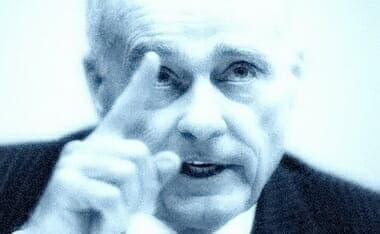(Originally posted October 2011, the 2nd reposting was when Vincent Bugliosi died in June 2015. I am reposting this March of 2022 to update the media in the post.)
I am re-posting this because Vincent Bugliosi just passed away. He was a legend in his field who wrote many good books. But even smart people say DUMB things.
INCORRECTLY DEFINING AGNOSTICISM
I was surprised in listening to Vincent Bugliosi in an interview about his book, Divinity of Doubt: The God Question. Surprised because considering his book on debunking pretty much every JFK conspiracy known to man, I would expect him to realize his fundamental mistake that taints his whole view.
So when I heard Mr. Bugliosi quote Gertrude Stein as part of his definition of agnosticism…..
“There ain’t no answer.
There ain’t gonna be any answer.
There never has been an answer.
There’s your answer.”
…. I immediately knew he was a second rate skeptic churning every old cliché over again for a new generation.
PROPERLY DEFINING “SOFT” & “HARD” AGNOSICISM
So here we should define for the layman what an agnostic is and why some say that there are two kinds… one being indistinguishable from an atheist.
✓ Atheism: The belief that there is no God. This is typically the conviction that there is no personal Creator of the universe, and no powerful, incorporeal, perfect being in heaven or anywhere else.
✓ Agnosticism: The state of not-knowing whether there is a God or not. The humble agnostic says that he doesn’t know whether there is a God. The less humble agnostic says that you don’t, either. The least humble agnostic thinks that we can’t ever really know.
Tom Morris, Philosophy for Dummies (Foster City, CA: IDG Books, 1999), 238.

Okay, most philosophy texts and dictionaries will at times make this distinction. Again, that there are two types of agnostics. A soft agnostic says: “I do not know. You may. Therefore I may want to dialogue because you may have information I do not.” A hard agnostic says: “I do not know, and neither can you.”
But what about what Vincent Bugliosi said about the impossibility of knowing?
Does he know this possibility?
Let me show how his position is self refuting, incoherent, and illogical. This comes from my “chapter” via my “book” on Reincarnation vs. the Laws of Logic (references at linked chapter):
….To begin, pantheists claim that God is unknowable because it [God] is above and beyond human logic. In other words, we are told that we cannot intellectually comprehend God because he is beyond all understanding. However, this is nonsensical and self-defeating statement. Why? “Because the very act of claiming that God is beyond logic is a logical statement about God.” Also, to say that we cannot know or comprehend God, as do the agnostics, is to say that we know God. How? I will answer this with a response to agnostic claims by the associate professor of philosophy and government at the University of Texas at Austin:
To say that we cannot know anything about God is to say something about God; it is to say that if there is a God, he is unknowable. But in that case, he is not entirely unknowable, for the agnostic certainly thinks that we can know one thing about him: That nothing else can be known about him. Unfortunately, the position that we can know exactly one thing about God – his unknowability in all respects except this – is equally unsupportable, for why should this one thing be an exception? How could we know that any possible God would be of such a nature that nothing else could be known about him? On what basis could we rule out his knowability in all other respects but this one? The very attempt to justify the claim confutes it, for the agnostic would have to know a great many things about God in order to know he that couldn’t know anything else about him.
Although not the time nor place to explain the law of non-contradiction, for those who do not know, a brief perusal may be warranted. The law of non-contradiction is simply this: “‘A’ cannot be both ‘non-A’ and ‘A’ at the same time.” In the words of Professor J. P. Moreland:
When a statement fails to satisfy itself (i.e., to conform to its own criteria of validity or acceptability), it is self-refuting…. Consider some examples. “I cannot say a word in English” is self-refuting when uttered in English. “I do not exist” is self-refuting, for one must exist to utter it. The claim “there are no truths” is self-refuting. If it is false, then it is false. But is it is true, then it is false as well, for in that case there would be no truths, including the statement itself.
You see, Mr. Bugliosi is denying that you know, which means he REALLY KNOWS… which is self defeating.
You can see in this mock conversation how this woks out:
Teacher: “Welcome, students. This is the first day of class, and so I want to lay down some ground rules. First, since no one person has the truth, you should be open-minded to the opinions of your fellow students. Second… Elizabeth, do you have a question?”
Elizabeth: “Yes I do. If nobody has the truth, isn’t that a good reason for me not to listen to my fellow students? After all, if nobody has the truth, why should I waste my time listening to other people and their opinions? What’s the point? Only if somebody has the truth does it make sense to be open-minded. Don’t you agree?”
Teacher: “No, I don’t. Are you claiming to know the truth? Isn’t that a bit arrogant and dogmatic?”
Elizabeth: “Not at all. Rather I think it’s dogmatic, as well as arrogant, to assert that no single person on earth knows the truth. After all, have you met every single person in the world and quizzed them exhaustively? If not, how can you make such a claim? Also, I believe it is actually the opposite of arrogance to say that I will alter my opinions to fit the truth whenever and wherever I find it. And if I happen to think that I have good reason to believe I do know truth and would like to share it with you, why wouldn’t you listen to me? Why would you automatically discredit my opinion before it is even uttered? I thought we were supposed to listen to everyone’s opinion.”
Teacher: “This should prove to be an interesting semester.”
Another Student: “(blurts out) Ain’t that the truth.” (Students laugh)
Francis Beckwith & Gregory Koukl, Relativism: Feet Planted in Mid-Air (Baker Book House; 1998), p. 74.
Do you see? After listening to Bugliosi himself do you understand where he went wrong? If you are a person who thinks like Bugliosi, may I posit that you are just as dogmatic as the most dogmatic atheist.
BONUS: RELATIVISM






